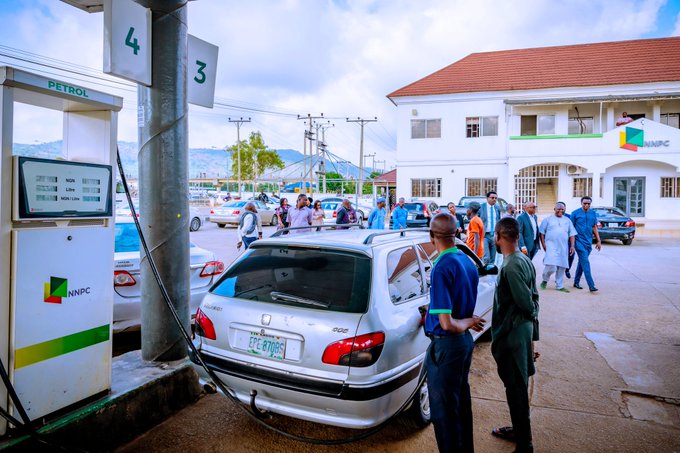The Independent Petroleum Marketers Association of Nigeria (IPMAN) has announced that petrol will be sold at a reduced price of N935 per litre, effective from Monday, 24th December 2024. This significant reduction in fuel prices follows a new arrangement by Dangote Refinery, which is expected to benefit both marketers and consumers across the country.
Alhaji Maigandi Garima, the National President of IPMAN, made this known in an interview with the News Agency of Nigeria (NAN) in Abuja on Sunday. He attributed the price reduction to the drop in Dangote Refinery’s fuel ex-depot price, as well as the new uniform pricing system introduced by the refinery.
“This new pricing system is a big step forward for the industry,” Garima said. “The Dangote Refinery’s ex-depot price has now been set at N899.50 per litre, which is a significant reduction from the previous rate of N970 per litre. This will allow marketers to sell at N935 per litre at their outlets nationwide.”
Dangote Refinery, which has recently begun operating at full capacity, has introduced a 7.27% price cut, reducing its price from N970 to N899.50 per litre at its loading gantry. This move is seen as a direct response to the ongoing need to make fuel more affordable for consumers, particularly during the busy festive season. The refinery has also offered more flexible credit terms to marketers, enabling them to purchase fuel at the new, lower rates.
Reducing Fuel Prices Amidst Festive Period
The price reduction, which is designed to alleviate the financial strain of high fuel costs, will be implemented nationwide starting Monday. It follows a successful pilot programme in Lagos, where the new price of N935 per litre was already available at select retail outlets.
Garima further explained that the new arrangement ensures that fuel prices across the country will be more uniform. “Dangote Refinery has worked out a plan to ensure the prices are consistent across the country. This is an effort to make sure that the price of fuel does not vary too much between regions,” he said.
This move by Dangote Refinery is welcomed by marketers, who see it as a much-needed relief during the holiday season. Many parts of Nigeria, particularly the Northern and Eastern regions, had experienced fuel prices as high as N2,000 per litre during the 2023 festive period due to supply shortages and reliance on imported fuel.
However, the situation has improved this year, with prices expected to stay at or below N1,100 per litre in these regions. According to Garima, this reduction is largely due to the increased production capacity of Nigeria’s local refineries, which now includes Dangote Refinery, as well as the expected resumption of operations at other refineries such as the Warri and Kaduna plants in the near future.
The Benefits of Deregulation
Garima also noted that the current price reduction is a result of the ongoing deregulation of Nigeria’s petroleum sector. Under deregulation, the government has reduced its control over fuel prices, allowing market forces to dictate the cost of petrol. This has led to increased competition among marketers and, as a result, more affordable prices for consumers.
“With more private sector players coming into the refinery business, the competition will continue to push prices down. We expect that, in the near future, petrol prices will be even lower as more refineries come online,” Garima added.
He pointed out that Nigeria’s dependence on imported fuel in previous years had contributed to higher prices. However, with the start-up of local refineries like Dangote, the price of petrol has become more competitive, benefiting consumers.
A Bright Future for the Petroleum Sector
IPMAN’s president also expressed optimism about the future of the sector, particularly with the ongoing activities of the Nigerian National Petroleum Corporation (NNPC). Recently, NNPC announced a reduction in its own ex-depot price from N1,020 to N899 per litre. This move has further supported the downward trend in fuel prices, which is expected to continue as more local refineries begin production.
“NNPC’s crude swap deal is a positive development for the country’s economy,” Garima said, praising the national oil company’s efforts to secure cheaper fuel for the nation.
In addition to Dangote’s refinery, Garima mentioned that other refineries, including those in Warri and Kaduna, will soon resume operations. This will further enhance the country’s fuel supply, leading to lower prices and greater stability in the market.
Looking Ahead: What This Means for Nigerians
For Nigerian consumers, this price reduction is a welcome relief. The festive period often sees a sharp increase in fuel consumption, as people travel across the country to spend time with family and friends. Lower petrol prices are expected to ease the financial burden on many households, especially during a time when many Nigerians are already grappling with the rising cost of living.
Marketers, too, are expected to benefit from the more stable and competitive pricing system. The reduction in prices should encourage more Nigerians to buy fuel from official outlets, rather than resorting to black market sources where prices are often much higher.

